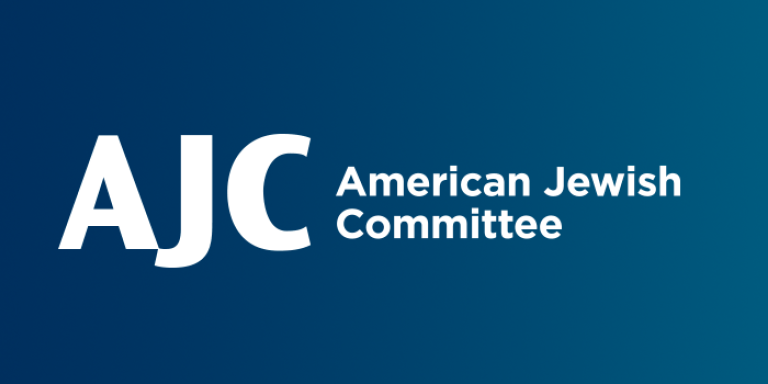As the parent of a Jewish student in grades 6-12, you may be concerned about the Jewish student experience in the current landscape and whether your child’s school is effectively addressing anti-Jewish hate.
American Jewish Committee (AJC), the global advocacy organization for the Jewish people, believes that accurate education, clear and enforced policies, and parent engagement are key to helping improve school environments for Jewish students. AJC is here to help. Our education experts routinely work in partnership with middle and high schools to help increase their awareness and understanding to build a more resilient atmosphere against rising Jewish hate. Please contact education@ajc.org so that we can support you and your child’s school.
Below are steps you can take to engage constructively with your child’s school:
OFFER TO HELP
- Introduce yourself to key administrators at your child’s school, as well as your child’s teachers. Make sure school administrators know how challenging and painful this moment is, with antisemitism rising at an unprecedented pace. Let them know how important it is to prioritize Jewish students' emotional well-being and physical safety. Offer to be a resource to help them take steps to raise awareness and create an environment that is free from Jewish hate.
ENCOURAGE LEARNING
- Offer AJC Training: Ask the school to provide educational programs about antisemitism for your school community. While antisemitism shares some commonalities with other forms of hate, it also operates uniquely and exhibits distinct manifestations. Understanding antisemitism, both historically and today, is a critical first step for effectively addressing this issue in school communities. AJC education experts offer presentations for students, faculty, administrators, and/or parents. We are happy to meet with administrators and/or diversity, equity, and inclusion (DEI) directors to discuss tailoring a program that meets the needs of your school culture.
- Inquire About Curriculum: Ask the school where explorations of the Jewish experience currently exist in the curriculum.
- Studying the history of the Jewish people, including – but not exclusively – the Holocaust and antisemitism, is critical to ensuring an informed citizenry. Antisemitism did not originate with the Nazis, nor did it end after World War II. Quality Holocaust education should include antisemitism’s historical roots and its evolution over time so that students understand how to recognize contemporary manifestations of the world’s oldest hate.
- Social Studies classes should include lessons that explore the experiences, contributions, and challenges faced by the Jewish people.
- English Language Arts (ELA) classes should include literature by Jews about the Jewish experience. Including Jewish history and literature in the school curriculum humanizes Jews and allows students of all backgrounds to see the diversity, resilience, connectivity, and creativity of the Jewish people over time and today.
- Educators must understand the Jewish connection to Israel and when discourse about Israel crosses the line into antisemitism. Education about the Israel-Palestinian conflict should be rooted in facts and primary sources and include different narratives and experiences.
- Jewish American Heritage Month: If your child’s school usually celebrates heritage months of various communities, encourage the school to recognize Jewish American Heritage Month in May. AJC partnered with Unpacked for Educators to create a Jewish American Heritage Month website that offers extensive resources for K-12 educational spaces.
- Diversity, Equity, Inclusion (DEI): Ask if Jewish people and antisemitism are included in your school’s DEI philosophy. Encourage your child’s school to recognize Jewish students and families as a unique group within the school community. AJC can help you advocate for the inclusion of Jews in your school’s DEI framework. Share AJC’s Guide to Jewish Religion and Culture with your school to help them avoid conflicts with Jewish holidays and learn about key Jewish cultural practices.
ENCOURAGE ADOPTION & ENFORCEMENT OF POLICIES
- Define Antisemitism: Encourage administrators to adopt and use the International Holocaust Remembrance Alliance (IHRA) Working Definition of Antisemitism as an educational tool to help the school community understand contemporary antisemitism.
- Social Media: Ensure the school has clear social media policies. Familiarize yourself with them to understand what is acceptable behavior for the entire school community—students, faculty / administration, and parents. Advocate for the school to hold age-appropriate conversations about the healthy use of social media. Together with your student, look through our resource, How to Engage with Social Media: A Guide for Jewish Teens.
- Incident Reporting: Confirm the school has a mechanism for reporting antisemitic incidents and a transparent process to follow for those who believe they have experienced or witnessed an antisemitic incident. This could include an online portal or designating a school staff member. Schools should be transparent with affected students about how the incident will be investigated and addressed. AJC has developed a resource to help: Reporting Antisemitism to Federal Agencies, Law Enforcement, and Social Media Guidance.
- Speak Out: When an antisemitic incident occurs at school—or a significant event affects the Jewish community—advocate for the administration to issue an unequivocal statement of support for Jewish students and condemnation of the antisemitic incident. AJC can provide guidance to you and your school if an incident occurs and feedback on statements.
- Walkouts/Protests: If an anti-Israel protest or walkout is planned or takes place at your child’s school, it is important that you speak with administrators immediately about what such events can mean for Jewish students. See this guidance.
FOR YOUR STUDENT & YOURSELF
- Leaders for Tomorrow (LFT): LFT is AJC's signature education and advocacy program for Jewish teens. It equips them with the knowledge and empowers them with the skills to speak up for the Jewish people and Israel.
- Jewish Parent Affinity Group: Find out if your child’s school has a Jewish parent affinity group. If there is one, get involved. If not, ask about starting one. Gathering with other parents of Jewish students provides you with the necessary support and can be instrumental in advocating collectively and effectively for policies that ensure Jewish student safety, as well as school community learning. Some Jewish parent affinity groups create events that collaborate with other groups, whether for mutual learning or simply to build relationships and empathy.
- Mental Health: If your child is dealing with anxiety or fears about antisemitism, reach out to mental health professionals who can help give your child the support they need. Start with the school, which may have counselors on staff to support students’ emotional well-being. Seek therapy in other ways, whether through private practice or by contacting a local Jewish organization that may provide counseling at a reduced cost.
- Communication is Key: Give your child space to ask questions and express their feelings. Help them feel heard and validated. Consistently reassess whether they feel safe and supported in their school environment.
RESOURCES TO LEARN MORE & SHARE
AJC Tools to Understand and Counter Antisemitism
- AJC’s Translate Hate Glossary: Understand antisemitic tropes, their history, and how they manifest today
- U.S. National Strategy: The White House released this comprehensive plan to confront antisemitism in America in May 2023
- AJC Guide for Independent Schools Administrators: Tools for Successful Implementation of the U.S. National Strategy to Counter Antisemitism
- AJC Guide for Administrators of U.S. Public Schools: Tools for Successful Implementation of the U.S. National Strategy to Counter Antisemitism




